Staying on top of your wellness is crucial, especially with regular home checks. This article guides you through essential aspects of liver health, focusing on the Standard Liver Blood Test (SLBT) commonly used in the UK. Learn how to interpret SLBT results and gain practical tips for conducting basic wellness checks at home. By understanding these steps, you can proactively manage your liver’s well-being and overall health.
- Understanding Liver Health and the Standard Liver Blood Test UK
- How to Conduct a Basic Wellness Check at Home
- Interpreting Your Liver Blood Test Results: What Do They Mean?
Understanding Liver Health and the Standard Liver Blood Test UK
Maintaining liver health is a crucial aspect of overall wellness, and one effective way to monitor it is through regular blood tests. In the UK, the Standard Liver Blood Test (SLBT) is a common screening method used to assess liver function. This test measures various enzymes and proteins in the blood, providing valuable insights into the state of your liver. Elevations or abnormalities in these markers can indicate potential issues, such as fatty liver disease, hepatitis, or other liver-related problems.
The SLBT typically includes tests for alanine aminotransferase (ALT), aspartate aminotransferase (AST), alkaline phosphatase (ALP), gamma-glutamyl transferase (GGT), and bilirubin. These enzymes offer a comprehensive look at the liver’s health, as elevated levels may suggest inflammation or damage. By understanding these results in the context of your medical history and other factors, individuals can take proactive steps to support their liver well-being.
How to Conduct a Basic Wellness Check at Home
Conducting a basic wellness check at home can be a valuable way to monitor your overall health and well-being, especially for individuals who may have specific health concerns or those looking to maintain a proactive approach to their fitness. One key component often included in these checks is the Standard Liver Blood Test UK, which provides insights into liver function.
To perform this test at home, start by acquiring a blood testing kit designed for liver function analysis. These kits typically include easy-to-follow instructions and all necessary supplies. Follow the guidelines carefully to ensure accurate results. This may involve drawing a small sample of blood from a finger prick or, in some cases, a venipuncture. Once collected, the sample needs to be processed according to the kit’s instructions, usually involving placing it into a testing device that measures various liver enzymes and markers. After processing, compare the results with the provided reference range to interpret whether your liver function is within a healthy spectrum. Regularly conducting such checks can help identify potential issues early on, allowing for timely intervention and proactive care.
Interpreting Your Liver Blood Test Results: What Do They Mean?
A standard liver blood test, commonly performed in the UK, is a crucial tool for assessing liver health. The results can provide valuable insights into your liver’s functionality and help identify potential issues early on. When analysing these results, it’s important to understand that various factors can influence liver function, including age, gender, and overall health status.
The test typically measures levels of specific enzymes, such as alanine aminotransferase (ALT) and aspartate aminotransferase (AST), which are indicators of liver damage or inflammation. Normal ALT and AST levels usually suggest a healthy liver. However, elevated levels may signal issues like hepatitis, fatty liver disease, or even more serious conditions. Other markers, such as bilirubin and albumin, also play roles in evaluating liver health; bilirubin indicates the presence of broken-down red blood cells, while albumin is a protein produced by the liver that helps maintain fluid balance and supports various bodily functions.
Regular wellness checks, especially a simple at-home liver blood test using the Standard Liver Blood Test UK kit, can be a powerful tool for monitoring your overall health. By understanding the meaning of your test results, you gain valuable insights into your liver’s health—a vital component of your body’s complex system. Empowered with this knowledge, you can make informed decisions to maintain and improve your well-being.
